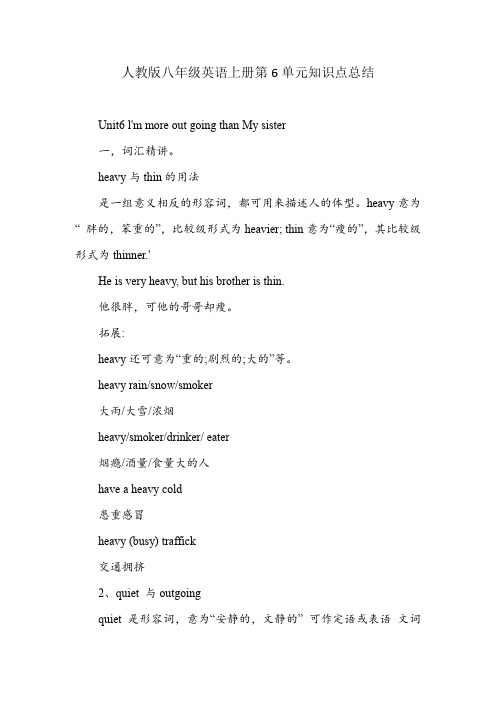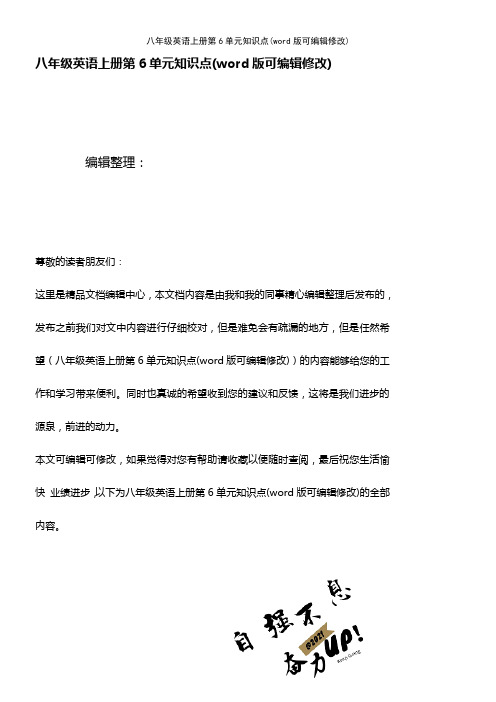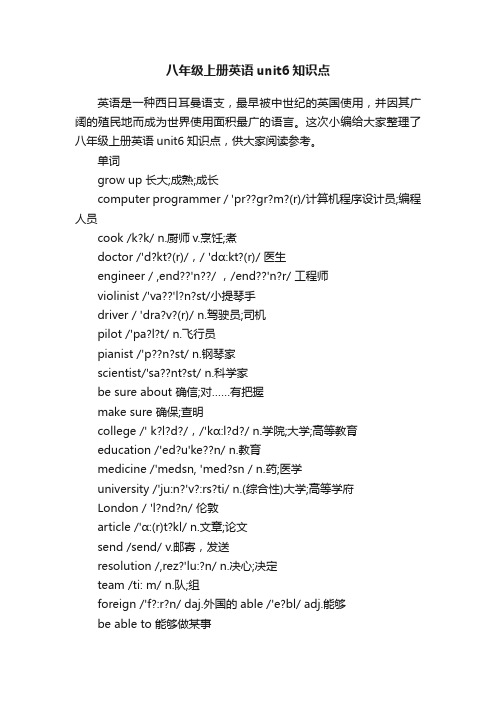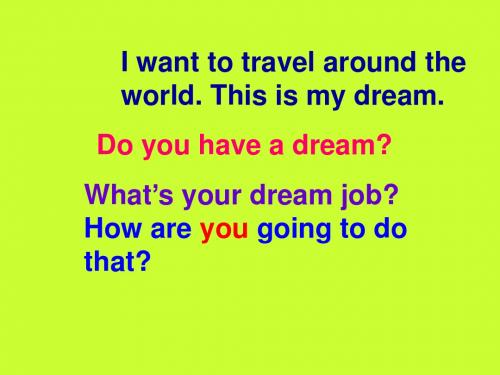2013八年级英语上Unit 6单元知识讲解
八年级上册英语知识点第六

八年级上册英语知识点第六Unit 6: Jobs and OccupationsIn Unit 6 of the eighth-grade English textbook, students will learn about jobs and occupations. This unit is aimed at providing the learners with an understanding of different types of jobs and their related vocabulary. The unit is divided into four sections, each covering a different aspect of the topic.Section 1: Introducing Jobs and OccupationsThe first section of the unit is an introduction to different jobs and occupations. It includes vocabulary related to various professions such as doctors, teachers, engineers, and chefs. The section also covers the different types of jobs, such as full-time, part-time, freelance, and temporary. After completing this section, students will have a broad idea of different jobs and occupations.Section 2: Skills and QualificationsSection 2 of the unit focuses on the skills and qualifications required for different jobs. It covers the necessary education,experience, and personal qualities needed to succeed in different professions. The section also includes related vocabulary, such as "qualification," "experience," and "certification." After completing this section, students will be able to understand how different skills and qualifications are required for different jobs.Section 3: Finding a JobSection 3 of the unit covers the process of finding a job. It includes vocabulary related to job advertisements, applications, and interviews. The section also covers tips on how to prepare a resume and a cover letter. After completing this section, students will have an understanding of how to search for a job.Section 4: Talking about JobsThe last section of the unit is about talking about jobs. It includes vocabulary related to discussing work and daily routines. Students will learn how to talk about their jobs and daily activities in simple English. The section also covers related grammar, such as present simple tense. After completing this section, students will be able to talk about their jobs and daily routines in English.In conclusion, Unit 6 of the eighth-grade English textbook provides students with a comprehensive understanding of jobs and occupations. By the end of the unit, students will have an understanding of different types of jobs, necessary skills and qualifications, finding a job, and talking about jobs. This unit will not only help students improve their English language skills but also prepare them for their future careers.。
Units6---10单元重要知识点汇总暑假预习人教版八年级英语上册

8年级上册6---10单元重要知识点汇总Unit 6 I'm going to study computer science.1.时间状语从句和grow up的用法教材原文What do you want to be when you grow up?你长大后想成为什么? (1)这是一个含有时间状语从句的主从复合句。
主句含有want to be 结构,从句是when引导的时间状语从句。
一般情况下,若主、从句的动作均未发生,则主句为一般将来时的句子、祈使句或含有情态动词的句子,从句用一般现在时代替一般将来时。
如:I’m going to play basketball when I finish my homework.我完成家庭作业后,打算去打篮球。
(2)grow up常用来指人或动物长大、成长或成熟,还可以引申为“发展”的意思。
如:She grows up fast.她成长得很快。
教材原文—How are you going to do that?你打算怎样去做那件事?—I’m going to practice basketball every day.我打算每天练习打篮球。
Playing the piano well needs more practice. 弹好钢琴需要更多练习。
She is practicing singing the new song.她正在练习唱这首新歌。
3.keep on的用法教材原文Well, I’m going to keep on writing stories, of course.哦,当然我会继续写故事。
keep on doing sth.意为“继续做某事”,强调反复性和决心,既可接瞬间动作(表示反复),又可接持续动作。
如:Mr. Wang kept on explaining until the students understood.王老师反复地解释直到学生们听懂了为止。
八年级英语上unit6知识点梳理

八年级英语上unit6知识点梳理本文是八年级英语上unit6知识点的梳理,旨在帮助学生检查自己在学习本单元知识点中的理解情况,更好地掌握和应用相关的知识。
一、动词-ing形式和动词不定式的用法在英语中,动词-ing形式和动词不定式都具有动词的基本意义,但在用法上却有所不同:动词-ing形式可以用作主语、宾语、表语等。
例如:- Swimming is good for health. 游泳对健康有益。
- I enjoy singing. 我喜欢唱歌。
- Her hobby is painting. 她的爱好是绘画。
而动词不定式则可以用作主语、宾语、表语、宾补、定语、状语等。
例如:- To live a happy life is everyone's dream. 过上快乐的生活是每个人的梦想。
- I want to visit the Great Wall. 我想参观长城。
- The most important thing is to be kind. 最重要的是要善良。
二、被动语态的构成和用法被动语态是英语中常用的一种语态,表示动作的承受者或对象,通常以动词的过去分词形式为基础,加上与主语相应的be动词或情态动词构成。
例如:- The letter was written by John. 这封信是约翰写的。
- The book has been read by many people. 这本书被很多人阅读过。
被动语态的用法有以下几点:1.强调动作的承受者或对象。
2.避免重复使用主语或让主语不重要。
3.在不知道动作执行者的情况下使用。
三、虚拟语气的用法英语中的虚拟语气是用于表达与事实相反或未发生的假设情况的语气。
虚拟语气常见的形式包括:虚拟条件句、愿望句和建议句等。
例如:1.虚拟条件句:表示与事实相反或可能性很小的假设情况。
其中,与现在事实相反的用过去时,与过去事实相反的用过去完成时,与将来事实相反的用would/could/might+动词原形。
人教版八年级上册英语第六单元Unit6《重要知识点》汇总总结

人教版八年级上册英语第六单元Unit6《重要知识点》汇总总结UNIT 6 I'm going to study computer science.Section A(1a-3c)重点短语1. grow up长大;成熟2. be sure about确信;对……有把握—be sure to do sth. 一定会做某事3. keep on 继续—keep on doing sth. 继续做某事4. make sure 确保;查明—make sure that /make sure of确保;设法保证5. be good at擅长于6. take acting lessons上表演课7. move to… 搬迁到…… 8. take singing lessons 上声乐课9. a race car driver 一名赛车手10. send…to…把……送到……11. computer programmer 计算机程序设计员12. a basketball player 一名篮球运动员13. want sb. to do sth. 想让某人做某事14. study medicine 学医学15. cooking school 烹饪学校16. one's plan for the future 某人的未来计划重点句型1. —What do you want to be when you grow up? 你长大了想成为什么?—I want to be an engineer. 我想成为一名工程师。
2. —How are you going to become a writer? 你打算怎么成为一名作家?—Well, I am going to keep on writing stories, of course. 哦,当然我要坚持不懈地写故事。
3. I’m going to write articles and send them to magazines and newspapers. 我将要写文章并向杂志社和报社投稿。
2013年新人教版新目标八年级英语上册Unit6单元Section B第二课时

have to do with
make promises
have…in common
write down for this reason take up
3a Complete the paragraphs about resolutions
with the words in the box.
take listen make is help learn are are Resolutions ___________ promises to yourself. They may______ to make you a help better person and to make your life easier. make I am going to ______ four resolutions.
To get the main idea of the passage by skimming To get the specific information about resolutions by scanning To be able to make resolutions with the words and phrases correctly
Read the passage and match each paragraph with its main purpose in the box.
3 ______ To question the idea of making resolutions 1 ______ To give the meaning of resolution 2 ______ To discuss the different kinds of resolutte down 写下 physical adj.身体的 themselves pron. 他们自己 have to do with 与……有联系 self-improvement n.自我改进 take up 开始做
八年级上册英语unit6知识点归纳

八年级上册英语unit6知识点归纳Unit 6的内容是关于Environmental protection的,学习这个单元的主要目的是学会如何保护环境,同时了解环境保护的重要性。
本文将从以下几个方面进行归纳:一、单词和短语1. garbage - 垃圾2. pollution - 污染3. environment - 环境4. recycle - 回收5. reduce - 减少6. reuse - 再利用7. save - 节省8. plastic - 塑料9. wildlife - 野生动物10. energy - 能源二、语法知识1. 现在进行时在描述目前正在进行的事情时,我们需要使用现在进行时。
例如:Pollution is a serious problem,so we are working hard to reduce it - 污染是一个严重的问题,所以我们正在努力减少它。
2. 情态动词几个常用的情态动词有can、must和should,它们被用来表示可能性、必须性和应该性。
例如:We should reduce plastic usage - 我们应该减少塑料用量。
三、对话1. 对话1A: Can you help me with this trash?B: Sure, I'll put it in the recycling bin.A: Great, thanks for helping to recycle.2. 对话2A: Have you heard about the pollution in the river?B: No, what happened?A: There was an oil spill and it's affecting the wildlife.B: We need to do something to prevent things like this from happening.四、阅读理解阅读理解在Unit 6中非常重要,因为它们可以帮助我们更好地理解环境保护的概念。
八年级英语上册“Unit 6”必背知识点

八年级英语上册Unit 6 I'm going to study computer science.必背知识点一、重点短语1. grow up:成长;长大2. every day:每天3. be sure about:对……有把握4. make sure:确信;务必5. send…to…:把……送到……6. be able to:能;能够7. the meaning of:……的意思/含义8. write down:写下;记下9. different kinds of:不同种类的10. hardly ever:几乎不;很少11. have to do with:与……有关系12. take up:开始从事;着手处理;接受13. too…to…:太……而不能……14. be going to + 动词原形:打算做某事15. practice doing:练习做某事16. keep on doing sth.:不断地做某事17. learn to do sth.:学会做某事18. finish doing sth.:做完某事19. promise to do sth.:许诺去做某事20. help sb. to do sth.:帮助某人做某事21. remember to do sth.:记住做某事22. agree to do sth.:同意做某事23. love to do sth.:喜爱做某事24. want to do sth.:想要做某事二、重点句型1. What do you want to be/ become when you grow up? 当你长大的时候想当什么?2. I want to be a/an…(如:computer programmer, doctor, engineer等):我想当……3. My parents want me to be a doctor, but I’m not sure about that. 我的双亲想要我当医生,但我还不确定。
人教版八年级英语上册Unit 6单元解读课件

语篇内容
语篇意义
核心词汇与句型
技能与策略学 习要点
第二 听力 课时 对话 Sectio nA 2d3b
2d在原来话题的基础上设置了更为 本对话为本单元的话 (1) I’m going to 1.基本掌握了
真实的情境——与他人交流自己未 题和目标语言提供了 study computer 一般将来时
来的职业。
Section A 2d 03 Andy and Ken discuss each other's dreams and
future plans
Section B 2a-2c 05 Introduced the definition, types, and characteristics
of resolutions.
听力 对话
1a-1b通过图文匹配和对话练习 此 部 分 的 话 题明 显 resolution, team,
and he expressed his desire to become a teacher and
plan to develop in Shanghai. Therefore, he plans to
02
graduate from high school and go to university to learn
A: Where are you going to work?
B: I’m going to move to Hangzhou.
8
?
02 学情分析
学情分析
在之前的英语学习中,学生学过一 些表示职业的单词和有关计划的动 词短语,有一定的基础语言知识储 备,这为本单元内容的学习打下了 良好的基础
师需设计灵活多样的教学实践活动 设计对学生多加训练和鼓励,渗透 学法指导多加引导,激发学生的学 习兴趣和积极性,使它们更有理想, 并为实现自己的而不断努力
人教版八年级英语上册第6单元知识点总结

人教版八年级英语上册第6单元知识点总结Unit6 l'm more out going than My sister一,词汇精讲。
heavy与thin的用法是一组意义相反的形容词,都可用来描述人的体型。
heavy意为“ 胖的,笨重的”,比较级形式为heavier; thin意为“瘦的”,其比较级形式为thinner.'He is very heavy, but his brother is thin.他很胖,可他的哥哥却瘦。
拓展:heavy还可意为“重的;剧烈的;大的”等。
heavy rain/snow/smoker大雨/大雪/浓烟heavy/smoker/drinker/ eater烟瘾/酒量/食量大的人have a heavy cold患重感冒heavy (busy) traffick交通拥挤2、quiet 与outgoingquiet是形容词,意为“安静的,文静的” 可作定语或表语文词outgoing; outgoing意为“外向的,友好为;擅于交际的”,其比较级为more outgoingThey walked to a quiet place.他们向一个安静的地方走去。
You have a cold, so you quiet at home.你感冒了,所以必须在家静养。
He is more outgoing than me.他比我更外向。
When we face danger, we should keep calm.面对危险,我们应该保持沉着、冷静。
The baby kept still when she was taking photos.当给这个婴儿拍照时,她一动也不动。
Be quiet, everyone. The teacher is coming. 同学们,安静!老师来了。
We shouldn't keep silent when the teacher asks us some questions.当老师问我们问题时,我们不应该保持沉默。
八年级英语上册第6单元知识点(K12教育文档)

八年级英语上册第6单元知识点(word版可编辑修改)八年级英语上册第6单元知识点(word版可编辑修改)编辑整理:尊敬的读者朋友们:这里是精品文档编辑中心,本文档内容是由我和我的同事精心编辑整理后发布的,发布之前我们对文中内容进行仔细校对,但是难免会有疏漏的地方,但是任然希望(八年级英语上册第6单元知识点(word版可编辑修改))的内容能够给您的工作和学习带来便利。
同时也真诚的希望收到您的建议和反馈,这将是我们进步的源泉,前进的动力。
本文可编辑可修改,如果觉得对您有帮助请收藏以便随时查阅,最后祝您生活愉快业绩进步,以下为八年级英语上册第6单元知识点(word版可编辑修改)的全部内容。
Unit6 I’m going to study computer science.一、词的转换1。
violin小提琴 (表人)violinist 小提琴家2。
piano钢琴(表人)pianist 钢琴家3。
science科学(表人)scientist科学家4.drive开车(表人)driver 司机5。
education教育(形容词)educational 有教育意义的6.send发送过去式sent7.foreign外国 (表人)foreigner外国人8.mean意味着(名词)meaning意思9.discuss讨论(名词)discussion讨论10。
begin开始 (名词)beginning开始11。
hobby爱好(复数)hobbies12。
week一周(形容词)weekly每周的13。
one person一个人(不可以说one people) (形容词)personal 个人的14.different 不同的(名词)differences不同、差异二、短语归纳1.grow up成长;长大2. improve in 在。
.。
.有所提高3。
be sure about对……有把握4。
make sure确信;务必+to do sth5.send…to…把……送到……6.be able to do sth 能够做某事 =can+动词原形7.the meaning of……的意思8。
人教版八年级上英语第六单元重点知识点整理

八上Unit 6 I’m going to study computer science.P411.What do you want to be when you grow up? 当你长大时你想成为什么?2.I want to be a computer programmer. 我想成为一个计算机程序员。
3.How are you going to do that?你打算怎么实现?how 对方式提示4.I’m going to study computer science. 我打算学习计算机科学。
Note: be going to do 打算做某事,一般将来时结构:主语+am/ is/ are going to do sth.变否变疑,有be直接用:变否定找到be动词后面加not,变一般疑问找到be动词大写提句首。
P421.What are you reading, Ken? 现在进行时am/is/are doing2.The Old Man and the Sea by Hemingway. by 由……著作3.Wow, now I know why you are so good at writing stories. Be good at doing sth. 擅长做某事。
4.Well, I’m going to keep on writing stories. 持续做某事5.Not everyone knows what they want to be. Just make sure you try your best. Make sure 确保try one’s best 尽某人最大的努力。
P451.Most of the time, we make promises to other people. 许诺2.When we make resolutions at the beginning of the year, we hope that we are going to improve our lives. Make resolutions 下决心,做决定at the beginning of 在……的开始improve our lives 改善我们的生活。
八年级上册英语unit6知识点

八年级上册英语unit6知识点英语是一种西日耳曼语支,最早被中世纪的英国使用,并因其广阔的殖民地而成为世界使用面积最广的语言。
这次小编给大家整理了八年级上册英语unit6知识点,供大家阅读参考。
单词grow up 长大;成熟;成长computer programmer / 'pr??gr?m?(r)/计算机程序设计员;编程人员cook /k?k/ n.厨师v.烹饪;煮doctor /'d?kt?(r)/,/ 'dɑ:kt?(r)/ 医生engineer / ,end??'n??/ ,/end??'n?r/ 工程师violinist /'va??'l?n?st/小提琴手driver / 'dra?v?(r)/ n.驾驶员;司机pilot /'pa?l?t/ n.飞行员pianist /'p??n?st/ n.钢琴家scientist/'sa??nt?st/ n.科学家be sure about 确信;对……有把握make sure 确保;查明college /' k?l?d?/,/'kɑ:l?d?/ n.学院;大学;高等教育education /'ed?u'ke??n/ n.教育medicine /'medsn, 'med?sn / n.药;医学university /'ju:n?'v?:rs?ti/ n.(综合性)大学;高等学府London / 'l?nd?n/ 伦敦article /'ɑ:(r)t?kl/ n.文章;论文send /send/ v.邮寄,发送resolution /,rez?'lu:?n/ n.决心;决定team /ti: m/ n.队;组foreign /'f?:r?n/ daj.外国的able /'e?bl/ adj.能够be able to 能够做某事question / 'kwest??n/ v.表示疑问;怀疑;提问;质询meaning /' mi:n?? / n. 意义;意思discuss /d?'sk?s/ v.讨论,商量promise / pr?m?s/,/ 'pr a: m?s/ n.承诺;诺言;v.许诺;承诺beginning / b?'g?n?? / n.开头;开端at the beginning of 在……开始improve /?m'pruv/ v.改进,改善write down 写下;记录下physical /'f?z?kl/ adj.身体的themselves / ??m'selvz/ pron.他(她、它)们自己have to do with关于;与……有关系self-improvement/self ?mp'ru:vm?nt/ n.自我改进,;自我提高take up(尤指为消遣)学着做;开始做hobby / 'h?bi/,/'hɑ:bi/ n.业余爱好weekly / 'wi:kli/ daj.&adv.每周的(地)schoolwork /'sku:lw?:k/ n.学校作业;功课agree / ?'gri:/ v.同意;赞成;允许agree with 同意own /o?n/ adj&pron 自己的;本人的personal /'p?:(r)s?nl/ adj.个人的;私人的relationship /r?'le??n??p/ n.关系;联系Andy /'?ndi/ 安迪(男名)Ken /ken/ 肯(男名)Hemingway /'hem??we?/ 海明威(姓)Kelly /'keli/ 凯莉(女名)The Old Man and the Sea 《老人与海》(美国作家海明威的小说) 重点短语1、grow up 长大2、every day 每天3、be sure about 对某事确信4、make sure 确信/有把握5、send…to…把…...发送到...…/把...…寄…...6、be able to 能/能够7、the meaning of …...的意思/含义8、 different kinds of 不同种类的9、have …..in common 有…共同点10、 at the beginning of 在…开始的时候11、write down 写下/记下12、 have to do with 与….有关系13、take up 开始从事/着手处理/接受14、 hardly ever 几乎不15、too…to… 太......而不能......重点句型1. What do you want to be/ become when you grow up?当你长大的时候想当什么?2. I want to be a/an computer programmer/ bus driver/ basketball player/ engineer/ cook/ teacher/ pilot/ scientist/ doctor/ violinist/ pianist /actor /actress/ singer/ race car driver/ reporter我想当……(职业名称)3. My parents want me to be a doctor, but I’m not sure about that.我的双亲想要我当医生,但我还不确定。
Unit 6 知识点归纳-人教版八年级英语上册

人教版英语八年级上册第六单元语法与知识点归纳(跟随课本)Unit 6 I’m going to study computer science.一、短语突破:1、computer science计算机科学2、grow up长大3、want to be想成为4、computer programmer电脑程序设计员5、basketball driver公交车司机6、basketball player篮球运动员7、practice doing sth练习做某事8、be good at...擅长...9、write stories写故事10、tell stories讲故事11、keep on doing sth. 坚持做某事12、of course当然13、be sure about...对...确定14、make sure确信15、try your best尽你最大努力16、Study hard 努力学习17、finish doing sth.完成做某事18、school teacher学校老师19、soccer players足球运动员20、a car driver一个赛车手21、a fast car 一辆快车22、go to a cooking school去一所烹饪学校23、take acting lessons 上表演课24、study medicine学医学25、at a university在一个大学26、in London在伦敦27、next September下个九月\明年九月28、Write articles 写文章29、send ... to...将...记寄到某处30、New year's resolution新年决心33、next year明年34、learn to do sth.学会做某事35、make the soccer team 成为足球队的一员36、get good grades取得好成绩37、get lots of exercise 进行大量的运动38、take guitar lessons上吉他课39、foreign language外语40、make a resolution下定决心41、for example例如42、good reasons好的理由42、a kind of一种43、most of the time大多数时间44、make promises to sb.向某人承诺45、get back from school从学校回来46、the most common 最常见的47、at the beginning of...在...的开端48、write down写下49、the coming year来年50、different kinds of不同种类的51、eat less fast food少吃快餐52、have to do with...与什么有关53、take up开始去做、学着去做54、make a weekly plan制定周计划55、have one thing in common 有一个共同点56、for this reason因为这个原因57、the best resolution最好的决心58、the first resolution第一个决心59、one’s own某人自己的60、personal improvement自我提高61、physical health身体健康62、have to必须、不得不don't have to不必63、go to university上大学二、容易混淆的知识点、短语等突破。
2013版_八年级英语Unit6 I'm going to study cmputer science.全单元免费课件

2. They are going to start an exercise program or eat less fast food. eat与have这两个动词都可以表示“吃”。 eat可用作及物戒不及物动词, 是日常用语, 但用在日常口语中不够礼貌。让别人“吃”, 通常用have。 eg: Where shall we have our dinner?
Explanation 1. at the beginning of this year 在今年的年初
beginning n. 开头, 反义词为 end,结束。 at the beginning of 在……开始 at the end of 在……末尾 from the beginning to the end 从头到尾 eg:He will come here at the beginning of this month. 我们在月初来到这里。
4. Sometimes the resolutions may be too difficult to keep.有些时候这些决定可能会太难而无法实现 1) 句中情态动词 may 表示推测,相当于汉语 的“可能;也许;大概”的意思。如: You may be right this time, but I’ m not sure. 这一次或许你是对的,但是我无法确定。
I’m going to practice every day. study really hard.
take lessons.来自3. What is he/she going to be when he/she grows up? He/She is going to be a\an…
4. How is he/she going to do that? He/She is going to practice every day.
2013版_八年级英语unit6_i'm_going_to_study_computer_science_全单元免费课件

is going to
--What is she going to be when she grows up?
--She is going to be … a dancer
practice dancing everyday
--How is she going to do that?
--She is going to … practice dancing everyday
be going to+动词原形结构 1、be going to 句型的用法 对于将要发生的事,戒打算、计划、决 定要做的事,皆以“be going to +动词 原形”的句型来表示,意为打算做…。 如:I’m going to be a teacher when I grow up. They’re going to play volleyball next week.
ቤተ መጻሕፍቲ ባይዱ
A: What is Cheng Han going to do?
B: He is going to learn how to teach children.
A: When is Cheng Han going to start?
B: He is going to finish high school and college first.
What He is going to be a teacher.
Where He is going to move to Beijing. He is going to learn how to teach How children. He is going to finish high school When and college first.
八年级上册unit6英语知识点

八年级上册unit6英语知识点八年级上册unit6英语知识点主要涉及时态、英语口语和阅读技巧。
本文将从这三个方面分别展开讲解。
一、时态1. 一般现在时一般现在时表示现在经常或习惯性的动作、状态或真理。
例如:I wake up at seven every morning.She watches TV every night.The earth moves around the sun.2. 现在进行时现在进行时表示现在正在进行的动作。
例如:I am watching TV now.She is studying at the library.They are playing soccer in the park.3. 一般过去时一般过去时表示过去发生的动作或状态。
例如:I watched TV last night.She studied at the library yesterday.They played soccer in the park last weekend.4. 过去进行时过去进行时表示过去正在进行的动作。
例如:I was watching TV at this time yesterday.She was studying at the library last night.They were playing soccer in the park when it started to rain.5. 现在完成时现在完成时表示过去某个时间开始到现在为止的动作或状态。
例如:I have watched five movies this month.She has studied English for three years.They have played soccer every week for a year.二、英语口语英语口语是英语学习中非常重要的一部分。
以下是几个英语口语技巧:1. 听懂对话英语口语基础是听懂对话。
人教版英语八年级上册Unit 6 知识点详解

Unit 6 I’m going to study computer science.知识点梳理1、cook厨师cook此处用作可数名词,意为“厨师” 。
His father is a great cook. 他的父亲是一位优秀的厨师。
I want to be a cook when I grow up. 我长大后想成为一名厨师。
[拓展]① cook还可作动词,意为“烹调,煮,烧”。
Every girl should learn to cook. 每个女孩都应该学习做饭。
My mother is cooking the fish. 我妈妈正在做鱼。
② cooker可数名词,意为“厨具” 。
He bought a new gas cooker. 他买了一个新煤气灶。
2、scientist科学家scientist可数名词,意为“科学家”,是以后缀-ist结尾的表示职业的名词。
常见的以-ist结尾的职业名词还有: pianist 钢琴家;artist艺术家;violinist小提琴手。
[拓展]本单元出现的职业的名词(短语)还有:computer programmer 计算机程序设计员cook厨师doctor医生engineer工程师driver驾驶员pilot 飞行员pianist 钢琴家teacher教师actor演员basketball player篮球运动员3、What do you want to be when you grow up?你大后想成为什么?( 1 )want to be意为“想成为······”,后常加表示职业的名词。
He wants to be an artist. 他想成为一名画家。
Does he want to be a singer like his uncle? 他想成为一名和他叔叔一样的歌手吗?(2 ) when意为“当··…·时候”,引导时间状语从句。
- 1、下载文档前请自行甄别文档内容的完整性,平台不提供额外的编辑、内容补充、找答案等附加服务。
- 2、"仅部分预览"的文档,不可在线预览部分如存在完整性等问题,可反馈申请退款(可完整预览的文档不适用该条件!)。
- 3、如文档侵犯您的权益,请联系客服反馈,我们会尽快为您处理(人工客服工作时间:9:00-18:30)。
Unit 6 I'm more outgoing than my sister.【重要词汇概览】◆more adv. (比......) 更,更多的,更大的(构成多音节形容词和副词的比较级) ◆than conj. 比◆calm adj. (心情) 镇静的,无忧虑的◆wild adj. 卤莽的,轻率的◆intellectual adj. 用脑筋的,有智力的,聪明的◆athletic adj. 体格健美的,体格强健的◆both pron. 二者,两者都◆popular adj. 受欢迎的,流行的,通俗的◆schoolwork n. 学业,功课◆laugh v. 笑,发笑◆opposite adj. 对立的,相反的◆view n. 观点,想法,态度◆interest n. 兴趣,爱好◆though conj. 虽然,既然,纵然【重要词组概览】◆be good at 擅长,善于,在......做得好◆twin sister 双胞胎姐妹◆in some ways 在某些方面◆look the same 看上去一样◆look different 看上去不同◆enjoy doing sth 喜欢做某事◆more than多于,超过◆between...and...在......和......之间◆as...as...和......一样◆lots of=a lot of许多, 大量的◆a little一点儿(修饰比较级,表示"更......一点儿" ) ◆the same as和......相同◆make sb. do sth. 使某人做某事◆like to do sth.喜欢做某事◆be important for sb.对某人重要◆be different from和...... 不同◆stay at home呆在家里【语法知识聚焦】1) 形容词的作用形容词在句子中一般充当表语、定语和宾语补足语,如:Our school looks very beautiful. (表语)There are fifty students in our class, so we need a big classroom. (定语)Doing morning exercises can make us healthy. (宾语补足语)2) 形容词的级别形容词有三种级别,即原级、比较级和最高级。
当讨论的对象是一个时应使用原级,当讨论的对象是两个时应使用比较级,当讨论的对象在三个或更多时应使用最高级。
在形容词原级后面加上er就成为比较级,在原级后加上est就成为最高级。
一般的单音节形容词直接加er或est,词尾是不发音字母e的只加r或st,重读闭音节应双写词尾辅音字母再加er或est,如:long—longer—longest,nice—nicer—nicest,big—bigger—biggest。
以辅音字母加y为结尾的双音节形容词应将y改为i再加上er或est,如:early—earlier—earliest,dirty—dirtier—dirtiest,busy—busier—busiest。
多音节的形容词比较级应在前面加上more,最高级应在前面加上most,如:important—more important—most important,difficult—more difficult—most difficult。
有些特殊的形容词有自己的变化规律,如:good/well—better—best,bad/badly—worse—worst,many/much—more—most,little—less—least,far—farther/further—farthest/furthest。
形容词的比较级句型应使用连词than或or,如:The weather in Shanghai is hotter than that in Beijing.上海的天气比北京的天气热.Which subject is more important, English or math?英语和数学, 哪个学科更重要?形容词的最高级前应加上定冠词the,句型中应给出比较范围,如:The Changjiang River is the longest river in China.长江是中国最长的河流.The third truck carries the most books of all.第三辆卡车在所有的卡车中载书最多.两个人或物比较时,如果只说明两者相同或不同,则可使用as...as...句型,否定句为not as (so)...as...句型,这里形容词仍使用原级,如:Mr. Green is as old as Mr. Brown.格林先生和布朗先生年龄一样大.Mr. Green is not as (so) old as Mr. Brown.格林先生和布朗先生的年龄不一样大.【综合能力检测】一.单词归类ear, subway, headache, hardly, go camping, nose, neck, sore throat, train, stomachache, often, babysitting, go sightseeing, shoulder, arm, fever, backache, sports camp, never, boat, plane, go bike riding, sometimes, always, busParts of body(人体部分):__________________________________________Conveyance(交通工具):__________________________________________Illness and discomforts(疾病和疼痛):__________________ ___________________________Frequency adverbs( 频率副词):____________________________________________Vacation activities( 假日活动):_____________________________________________二.选择填空() 1. The girl isn’t short. She is __________ than before.A. shortB. tallC. tallerD. shorter() 2. Li Ming and Lin Tao _________ black eyes.A. hasB. have bothC. both haveD. both has() 3. John is ___________ than Peter.A. funnierB. funC. funnyD. more funny() 4. My sister is __________ more outgoing than me.A. moreB. mostC. a littleD. little() 5. Her grandfather ___________ fishing on weekends.A. likes goingB. like goingC. likes goD. like to go() 6. I __________ a movie this Sunday.A. watchB. watchesC. watchingD. am watching() 7. A: Can you go to the concert with us?B: ________.A. I’d love toB. I’d likeC. I’d loveD. I’d like to() 8. I _______ a primary school student two years ago.A. amB. wasC. beD. were() 9. He likes to do the same things _______ me.A. inB. onC. likeD. as()10. Maria is a student. ________ is good at swimming.A. HeB. SheC. WeD. I三.连句1. we, like, both, the, doing, same, things__________________________________________________.2. Tom, has, than , Sam, shorter, hair_____________________________________________.3. on, We're, Wednesday, tennis, playing, with, school , the ,team____________________________________________________________.4. Tim, usually, school, subway, to, takes, the________________________________________________.5. do, how,often, exercise, you?___________________________________________?四. 根据句意,选择方框内所给的词语填空。
1. How long are you ________ in Miami?2. Are you ________? No, I’ m hungry.3. I live next to the school. I always ________ to school.4. Peter eats all the time. He is really ________ than everyone in our class.5. Lisa is so _______. She always makes everyone laugh.6. Mary rides her _______ to school everyday.7. Can you stud y with me? Yes, I’d _______ to.8. Today I have a piano _______. So I can’t go shopping with you.9. When are you ________ home?10.Can you go to the pop ________ with me?五. 用比较级填空1. Who is ___________( heavy), Wang Lin or Lin Tao?2. Mr Green is ______________( serious) than Mr Brown.3. The sun is ______________( big) than the earth.4. Unit 4 is ____________________( difficult) than Unit5.5. My mother is __________ (young) than your mother is.6. Which country is _________( large) , China or Japan?7. Mary has _________( long) hair than Betty.8. It’s ________( hot) in summer in Beijing than that in Dalian.9. Miss Yang is ___________ ( calm) than Miss Li.10. You are __________________( athletic) than Jim.六. 完成句子1. 他多长时间拜访祖父母一次?他每月拜访祖父母3到4次。
